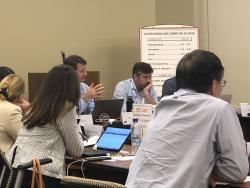Press Releases

The American Cancer Society, the largest non-government, not-for-profit funding source of cancer research in the United States, has approved funding for 75 research and training grants totaling $38,422,250 in the second of two grant cycles for 2019. The grants will fund investigators at 57 institutions across the United States; 60 are new grants while 15 are renewals of previous grants. All the grants go into effect January 1, 2020.
The grants include three new Research Professorships, a lifelong designation accompanied by a five-year $400,000 commitment. The awards are the most prestigious research grants made by the program.
Dmitry I. Gabrilovich, M.D., Ph.D. Wistar Institute The lab of Dr. Gabrilovich will continue its groundbreaking work to understand the roles played by myeloid immune cells in promoting tumor growth and will also explore new evidence indicating these cells may be converted to participate in the anti-tumor immune response. The work will uncover previously unknown features of myeloid cells in cancer and, more importantly, will provide new approaches to their therapeutic targeting.
Yibin Kang, Ph.D., Princeton University Dr. Kang’s team focuses on the molecular mechanisms driving breast cancer metastasis, in particular exploring how stromal cells in secondary organs provide cellular “niches” that allow cancer cells to metastasize. The new grant will build on the team’s study of tumor-stromal interactions in breast cancer bone metastasis and is expected to have important implications in improving the treatment of metastatic breast cancer.
Davide Ruggero, Ph.D., University of California, San Francisco Dr. Ruggero’s lab will build on its work aiming to repair the processes that prevent cell proliferation as part of the pathway that translates mRNA into proteins, a hallmark of cancer. Reprogramming these processes back to normal has the potential to change the outlook for cancer therapies and may shed light on ways to inhibit the cancer-causing effects of obesity.
In addition, three current five-year, $400,00 ACS Professorships were renewed: Wendy Demark-Wahnefried, Ph.D., RD, the University of Alabama at Birmingham; Mary-Claire King, PhD, University of Washington; and Matthew Meyerson, MD, PhD, Dana-Farber Cancer Institute.
The new cycle also includes Mission Boost Grants. These grants support current and past ACS grantees for additional, or “boost,” resources for innovative, high-risk/high-reward projects. The current cycle included boost grants to four individuals: Paul Nghiem, M.D., Ph.D., University of Washington; David B. Shackelford, Ph.D., University of California, Los Angeles; Andrew J. Holland, Ph.D., Johns Hopkins Hospital; and Jordan M. Winter, M.D., Case Western Reserve University.
Other highlights of the current cycle:
- Kate Lawrenson, Ph.D., Cedars-Sinai Medical Center, Decoding the Core Regulatory Circuitry of High-Grade Serous Ovarian Cancers (four-year, $792,000)
- Bisrat Debeb, Ph.D., University of Texas M.D. Anderson Cancer Center, Novel Mechanisms of Brain Metastasis in aggressive Breast Cancers (four-year, $792,000)
- Ji Young Yoo, Ph.D., niversity of Texas Health Science Center, Houston, Impact of Focal Adhesion Kinase (FAK) Signaling on Oncolytic HSV Therapy (four-year, $792,000)
- Yong Lu, Ph.D., Wake Forest University Health Sciences, A Novel Strategy for Immunotherapy to Kill the Escaped Variant Tumor Cells (four-year, $792,000)
- Ishwaria M. Subbiah, M.D. University of Texas M.D. Anderson Cancer Center, Technology-enhanced Palliative Care for Cancer Patients in Phase 1 Trials (four-year, $582,000)
- Led by principal investigator, Robert S. Mannel, M.D., the University of Oklahoma Health Sciences Center, was awarded a new three-year Institutional Research Grant. Ten other sites successfully renewed their existing programs. The grants provide essential seed funding for pilot projects that can provide the foundation for a successful cancer research career.
There are also two Physician Training Awards in Cancer Prevention, designed to develop board certified preventive medicine specialists who will be future leaders in research, education and interventions in cancer prevention and control: Dorothy Lane, M.D., Stony Brook University, Stony Brook, NY; and Victoria C. Costales, M.D., MPH, Griffin Hospital, Derby, Conn.
The American Cancer Society Extramural Research program currently supports research and training in a wide range of cancer-related disciplines at more than 200 institutions. With an investment of more than $4.9 billion since 1946, the ACS is the largest private, not-for-profit source of cancer research funds in the U.S., and has funded 47 researchers who have gone on to be awarded the Nobel Prize. The program primarily funds early career investigators, giving the best and the brightest a chance to explore cutting-edge ideas at a time when they might not find funding elsewhere.
The Council for Extramural Research also approved 79 grant applications totaling $48,669,250 that could not be funded due to budgetary constraints. These “Pay-If” applications represent work that passed the Society’s multi-disciplinary review process but are beyond the Society’s current funding resources. They can be and often are subsidized by donors who wish to support research that would not otherwise be funded. In 2018, more than $7 million in additional funding helped finance 32 “Pay-If” applications.
For more information about the American Cancer Society Research Program, please visit http://www.cancer.org/research.